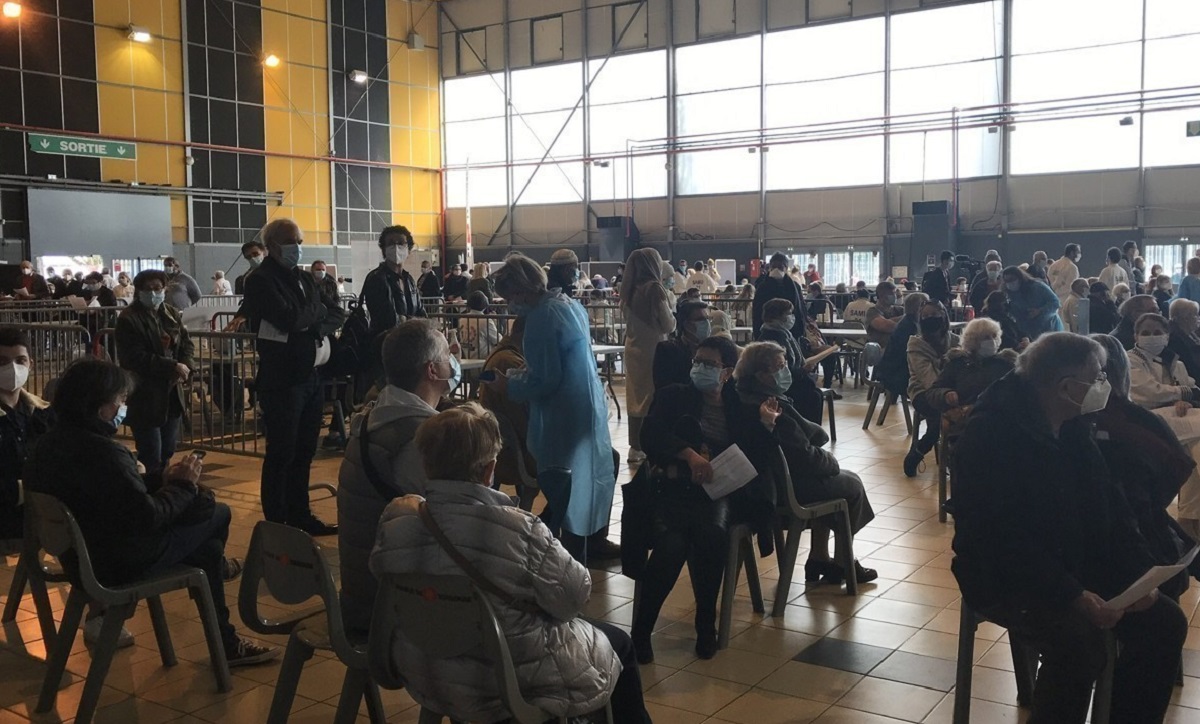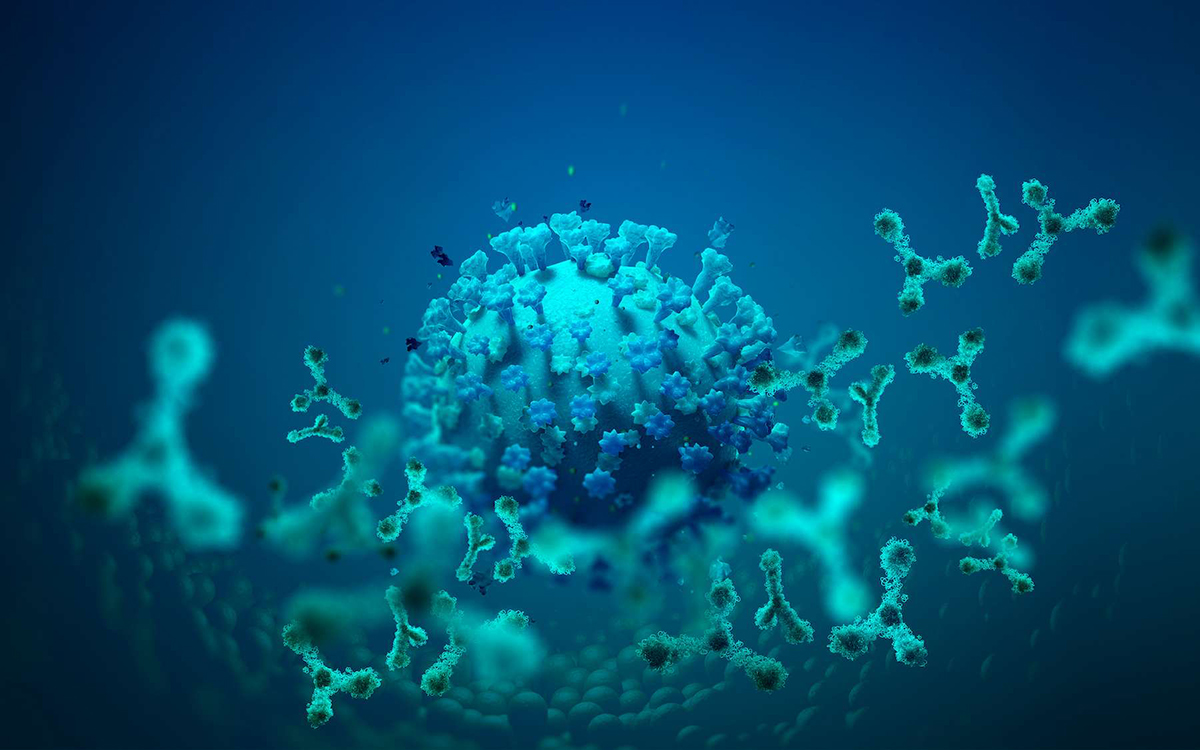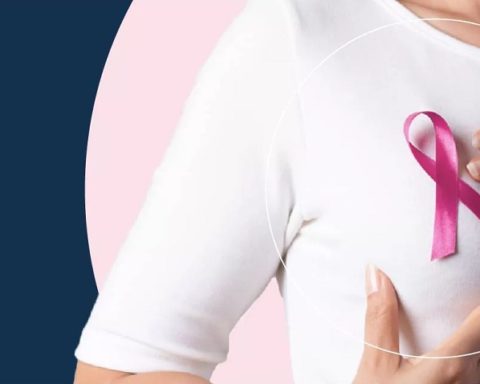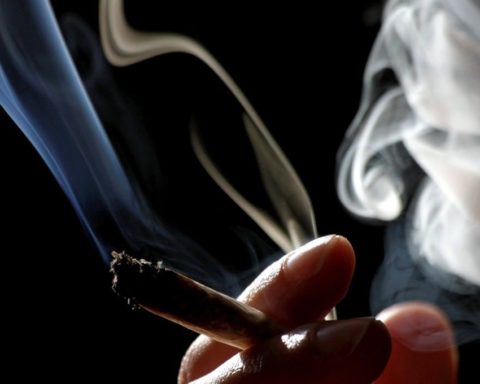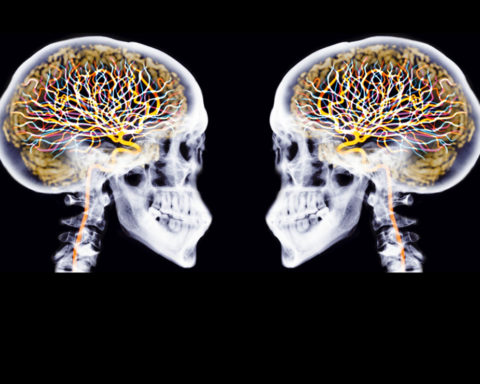Selon un dernier sondage de l’IFOP, et contre toute attente, les Français sont de plus en plus enclins à la vaccination, les professionnels hospitaliers aussi, celle-ci étant perçue comme le moyen incontournable de sortie de l’épidémie.
Les chiffres d’adhésion à la vaccination grimpent : Les Français étaient 41% fin novembre 2020 ; ils sont aujourd’hui 65% à être vaccinés ou souhaiter l’être (1). Un chiffre qui monte désormais à 82% chez les professionnels hospitaliers pour lesquels il s’agit là de la porte de sortie incontournable de l’épidémie. Et cela de manière plus marquée que l’ensemble des Français.
En effet, 82% d’entre eux ont l’intention de se faire vacciner ou le sont déjà, contre 65% des Français, avec la volonté de protéger les autres. Les étudiants sont quant à eux un peu en deçà avec 60% d’entre eux qui ont l’intention de se faire vacciner ou qui le sont déjà. Cela s’explique notamment par leur âge : moins à risques, ils sont à la fois moins prioritaires sur la vaccination et donc moins vaccinés que leurs confrères, et également personnellement moins enclins à se faire vacciner. Ce clivage se retrouve dans la population générale : 50% des moins de 35 ans sont vaccinés ou ont l’intention de l’être, contre 71% des plus de 35 ans. Cela peut s’expliquer par des populations moins sceptiques car ils ont en mémoire l’éradication de la variole, de la polio ou de la rougeole grâce à la vaccination.
Et pourtant, dans une étude de 2016, la France était le pays le plus « sceptique » de la planète face aux vaccins. A la première place de la défiance envers la vaccination !
Le cas français soulignait un grave problème de défiance. Les Français croyant de moins à moins à l’intégrité et à la compétence de l’État, de la communauté soignante et de l’industrie pharmaceutique pour ce qui concerne leurs vaccins. Les raisons restaient liées aux souvenirs du passé : de l’organisation militaire de la campagne de vaccination contre la grippe H1N1, aux cafouillages sur la vaccination contre l’hépatite B largement hors cible, et des divers scandales et profits excessifs sur les vaccins.
Aujourd’hui, le blason ne s’est pas redoré face aux mêmes cafouillages d’organisation et de gestion des masques il y a un an et les errements dans l’achat des doses de vaccins … sans parler des théories conspirationnistes sur l’origine de l’épidémie et sur le vaccin qui circulent sur les réseaux sociaux , mais aussi le doute face aux tergiversations des prises de position des recommandations sanitaires des autorités scientifiques.
L’état d’esprit non plus ne s’est pas amélioré ; il se serait plutôt dégradé : « Une montée de l’individualisme au détriment de l’altruisme » caractérise toujours une certaine défiance qui persiste selon Thierry Beaudet, Président de la Mutualité Française, qui retient aussi la perception par les Français d’un « Etat, puissant, vertical et lointain qui considère la santé publique et la politique vaccinale comme étant une vérité qu’il n’est pas besoin d’expliquer ou de partager ».
Mais les courbes s’inversent. Pourquoi ?
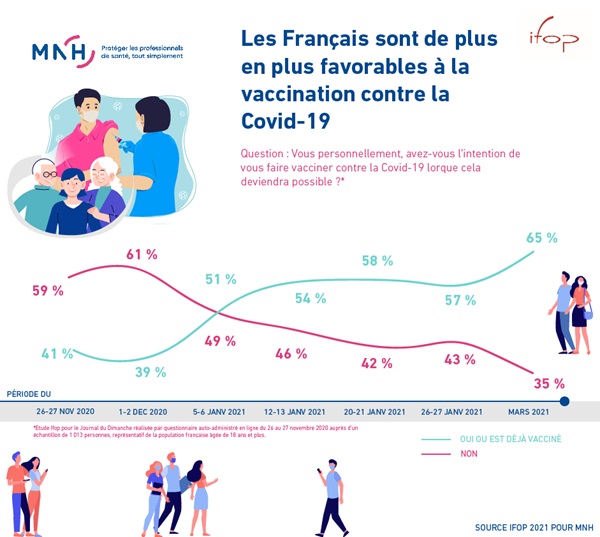
Niveau d’information, un levier fort sur l’intention de se faire vacciner
Selon Ifop, 65% des Français sont favorables à la vaccination, mais cette proportion grimpe à 79% chez ceux qui se sentent bien informés sur le vaccin et chute à 49% chez ceux qui se sentent mal informés, soit 30 points d’écart.
Les professionnels hospitaliers sont 82% à se dire favorables à la vaccination. Ils sont 91% parmi ceux qui se sentent bien informés sur la vaccination et seulement 70% parmi ceux qui se sentent mal informés, soit 21 points d’écart.
Des résultats de sondage plutôt encourageants malgré la faible disponibilité des doses de vaccins en France, le risque d’émergence de variants plus contagieux et la nouvelle défiance envers le vaccin AstraZenaca. Un risque de fragilisation de l’efficacité de la vaccination surveillé par le plan de pharmacovigilance à travers l’Union européenne. Son objectif est de rassurer et de sécuriser pour devenir un élément central de la sécurité sanitaire.
D’autres mesures ont été mises en place pour soutenir le plan vaccination : une trentaine de centres en France recueillent les signalements faits par des professionnels de santé mais aussi par des patients sur d’éventuels effets indésirables après une vaccination. Chaque semaine, l’agence du médicament, l’Ansm, fait un point national sur la question. Les agences sanitaires scrutent de près les effets indésirables des vaccinations qui n’auraient pas été déjà vus pendant les essais cliniques.
Existe aussi le projet Vaccine Confidence Project qui mène une étude mondiale pour suivre le sentiment et les émotions du public concernant les mesures actuelles et potentielles pour contenir et traiter le Covid-19.
Grâce à une combinaison d’enquêtes auprès de la population et de surveillance et d’analyse des médias sociaux dans le temps et l’espace, cette étude mondiale d’une durée d’un an examine la perception et le sentiment des mesures de distanciation sociale du Covid-19 et des outils médicaux potentiels dans le monde entier. Les tendances de l’opinion publique sont donc suivies dans le monde entier pour identifier l’évolution des perceptions, des comportements et des préoccupations à l’égard de la pandémie. Des données sont collectées sur les attitudes envers les traitements et les vaccins contre le Covid-19. Ces données permettent de soutenir les stratégies d’engagement du public et de renforcer la préparation à l’introduction des vaccins. Son objectif est d’identifier les « niveaux de confiance » quant aux vaccins dans l’espoir qu’ensuite, les services de santé publique comprennent mieux les raisons des différentes attitudes, et soient ainsi mieux équipés pour y réagir.
Des dispositions qui vont dans le sens des propos d’Antoine Bristielle et Thierry Beaudet, de la Mutualité Française, pour lesquels le remède est clair : seules la pédagogie et la transparence redonneront confiance aux Français. « Il faut combattre le doute par la transparence. Expliquer les méthodes de recherche de ce nouveau vaccin, faire part des tests effectués et ne rien cacher des possibles effets indésirables. »
Le vaccin : le moyen incontournable pour sortir de l’épidémie
72% des professionnels hospitaliers et 68% des Français considèrent que le vaccin est incontournable pour sortir de l’épidémie. Les raisons invoquées sont que 50% des professionnels hospitaliers et 55% des Français veulent se protéger du Covid-19 et 46% des hospitaliers et 37% des Français souhaitent protéger les autres du Covid-19.
Les motivations des étudiants hospitaliers diffèrent un peu : ils souhaitent avant tout protéger les autres (70%), jugent également le vaccin incontournable (61%) et souhaitent également avoir accès à différentes activités si celles-ci deviennent conditionnées à la vaccination (59%). Le souhait de protéger les autres est également la seconde raison invoquée par les actifs (54%) et avoir accès à différentes activités la troisième (44%).
« Les Français se rendent compte que personne n’est invulnérable face à cette maladie » explique l’infectiologue Benjamin Davido au journal 20minutes.fr. « Le virus se réveille dès que les mesures barrières faiblissent. Or, aujourd’hui, on est à la troisième vague, avec l’impression d’une pandémie sans fin. Donc l’opinion bascule, l’envie de sortir de cette crise dépasse la peur éventuelle du vaccin. »
Avec la promesse de millions de vaccins livrés au mois d’avril, bientôt chaque jour près de 500 000 personnes accéderaient à la vaccination.
Méthodologie de l’étude IFOP
L’enquête a été menée auprès de deux échantillons grand public et professionnels hospitaliers : 1035 personnes, représentatif de la population française âgée de 18 ans et plus et 5250 professionnels hospitaliers. Grand Public : les interviews ont été réalisées par questionnaire auto-administré en ligne du 16 au 18 mars 2021 / Professionnels de santé : les interviews ont été réalisées par questionnaire auto-administré en ligne du 8 au 17 mars 2021.
(1) Etude Ifop pour le Journal du Dimanche réalisée par questionnaire auto-administré en ligne du 26 au 27 novembre 2020 auprès d’un échantillon de 1013 personnes, représentatif de la population française âgée de 18 ans et plus.
Pour aller plus loin :
- La Mutuelle nationale des hospitaliers a recueilli les réactions et commentaires des professionnels de santé sur ce sujet, à l’occasion d’une table ronde : https://direct.mnh.live/lemission/

